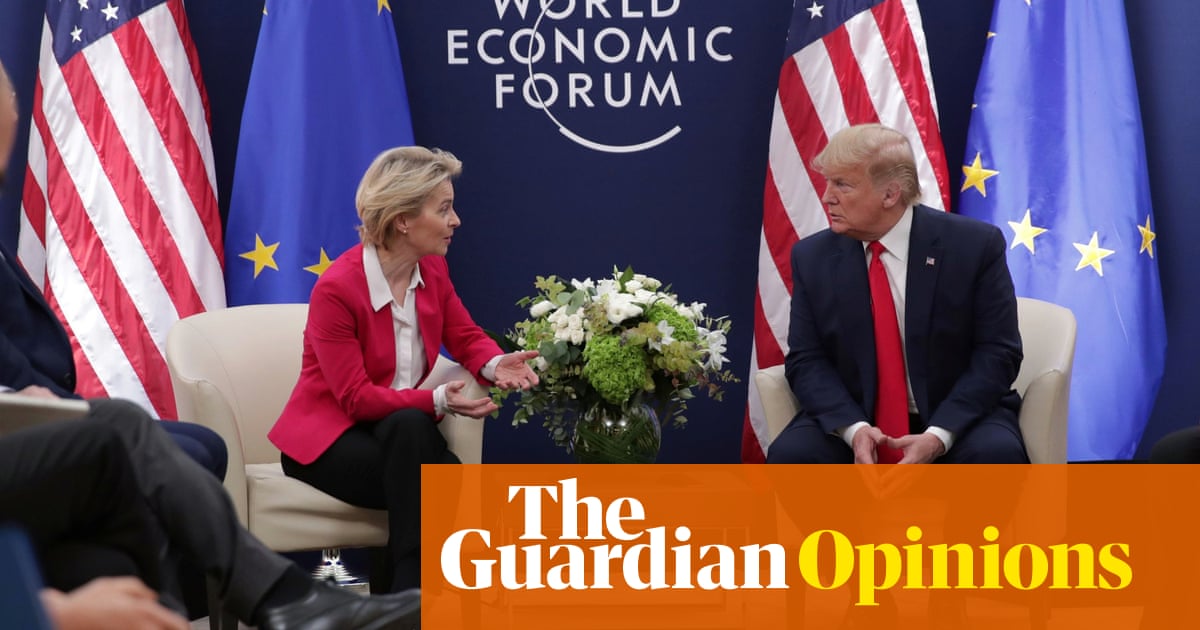There is nothing but bad news for Europe in Donald Trumpâs US election victory. The only question is just how bad it will get. Europeans stand to suffer strategically, economically and politically from his âAmerica firstâ policies, as well as from his unpredictability and transactional approach to global affairs. The undermining of Nato, the emboldening of illiberal nationalists everywhere, a transatlantic trade war, and a battle over European regulation of US social media platforms, AI and cryptocurrencies are just some of the major risks of a second Trump presidency.
Moreover, Europe is at risk of being squeezed in a deepening US-China trade conflict, with the prospect of coming under severe pressure from Washington to curtail economic ties with Beijing, while facing a potential flood of cheap Chinese goods diverted by prohibitive tariffs from the US market.
The prospect of severely strained transatlantic relations catches Europe at a moment of great fragility. European economies are lagging behind the US and China in innovation, investment and productivity. Germany and France are weakened by political crises. Rightwing populists, playing on fears of globalisation and migration, are on the rise across Europe, too. And Russian troops are slowly grinding forward against Ukrainian defenders, while the west is not delivering enough support for Kyiv to prevail.
It is far from clear whether EU countries will be able to unite in defence of common interests if a Republican administration presses ahead with threatened tariffs on all European goods â or if Trump tries to throw Ukraine under a bus and cut a deal with Russian president Vladimir Putin to end the war on terms humiliating for Kyiv. History is not encouraging.
The Polish prime minister, Donald Tusk, one of the EUâs few strong centre-right leaders, declared at the weekend that âthe era of geopolitical outsourcing is overâ. Europe, he said, needed to finally grow up and believe in its own strength. He is not alone in wishing that Trumpâs victory would jolt Europeans into doing more collectively for their defence, and building a stronger European pillar of Nato. France has long been pushing for such âstrategic autonomyâ, but many EU countries remain wary of anything that could weaken the transatlantic bond.
EU countries conduct trade policy together, so the European Commission has had a back-room team preparing for a possible Trump return for weeks, readying ways to hit back fast and hard if necessary in any tariff dispute. But it is far from clear whether Ursula von der Leyen will be able to marshal the 27 EU states behind a common line. There could be a repeat of the unseemly scramble to Washington we saw during Trumpâs last term to curry favour with the White House and try to secure better terms for individual European countries, perhaps in exchange for buying more US weapons.
Von der Leyen reminded Trump in a congratulatory message that âmillions of jobs and billions in trade and investment on each side of the Atlantic depend on the dynamism and stability of our economic relationshipâ. But the incoming US president is obsessed with the imbalance in goods trade with Europe, and especially with German cars.
Strategically, Trumpâs win is bound to revive uncertainty over the future of Nato, which he threatened to quit during his first term in the White House. While Congress has since enacted a law making it harder for the US to withdraw from the alliance, nothing can prevent the president from undercutting its credibility by making clear he would not come to European countriesâ defence against Russian aggression. Trump said as much earlier this year, asserting that he would encourage Russia to do âwhatever the hell they wantâ with Nato allies that did not pay enough in defence spending.
Trumpâs supporters say his tough approach in his first term shocked European allies into finally increasing defence spending â and that he is right to question why American taxpayers should go on subsidising the security of wealthy European countries that free-ride on US protection. Fiona Hill, his former White House Russia adviser, told me Trump simply did not understand the value of alliances or allies. His approach to security is purely transactional.
The impact of a second Trump presidency on Europeâs internal politics may be just as damaging as on trade and international relations. One veteran former EU official said Trump would not only embolden national populist leaders like Hungaryâs Viktor Orbán, Slovakiaâs Robert Fico and Serbiaâs Aleksandar VuÄiÄ to form a sort of âilliberal internationaleâ, but his influence could also pull mainstream European conservatives further to the right on migration and gender issues, weakening Europeâs liberal values.
Among Trumpâs billionaire backers were libertarian US tech entrepreneurs Elon Musk and Peter Thiel, who are counting on him to allow a free-for-all on social media, artificial intelligence and cryptocurrency. Musk has been defiant in the face of EU and UK efforts to regulate hate speech and disinformation on his X social media platform.
after newsletter promotion
The tech baronsâ quest for unfettered power to build their empires beyond the reach of governments and central banks is bound to set up a confrontation during a second Trump term with European legislation regulating the internet, AI and electronic currencies. This is another transatlantic crisis in the making.
Given such a bleak outlook, the EU and the UK ought to be proactively preparing for the worst, and moving closer together to defend their many common interests and values. Sadly, thereâs little sign of that in the timid foreplay between the two so far.



